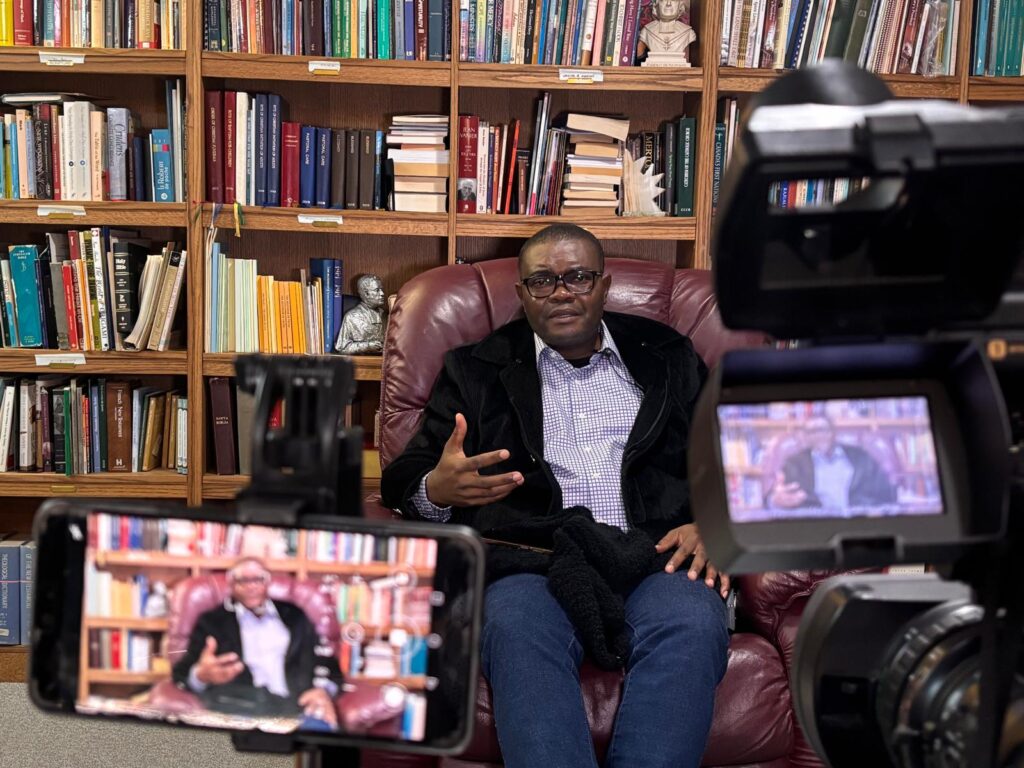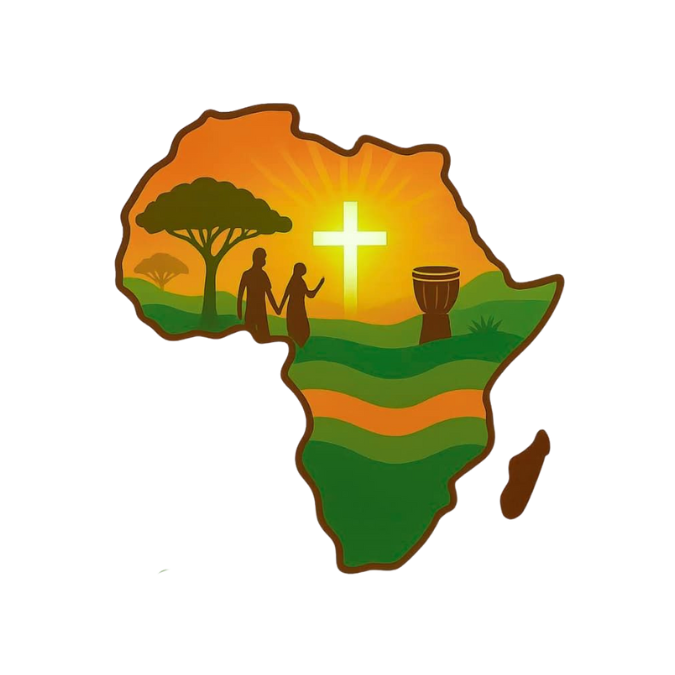
A Voice Afrique Interview with Rev. Fr. Lawrence C. Emehel, Director, Department of Mission and Dialogue, Catholic Secretariat of Nigeria
Rev. Fr. Lawrence Chukwunweike Emehel is a priest of the Catholic Diocese of Sokoto, in northwestern Nigeria — a region known for its rich Islamic heritage and complex interreligious dynamics. Nearly a year into his tenure as Director of the Department of Mission and Dialogue at the Catholic Secretariat of Nigeria (CSN), Fr. Emehel speaks with Voice Afrique about Nigeria’s mounting religious tensions, the pain of targeted violence, and the enduring necessity of dialogue in a fragile nation.
Born and raised in Sokoto, Fr. Emehel served for years in rural parishes across Katsina State, often in communities composed almost entirely of Hausa-speaking Muslims. He describes those experiences as foundational to his priesthood. His pastoral work, combined with fluency in Hausa and formal studies in Islamic theology — completed in Cairo and Rome — shaped his understanding of dialogue not as abstract theory but as daily reality.
Today, his mission at the CSN is both pastoral and national: to strengthen interreligious understanding among Christians, Muslims, and adherents of African Traditional Religion (ATR).
Fr. Emehel emphasizes that dialogue is often misunderstood. “People think it’s just bishops and imams sitting around with tea,” he explains with a smile. “But dialogue is much more than that — it happens in daily life, in joint action, and within real communities.”
Under his leadership, the Church has trained dialogue directors in all 36 states and the Federal Capital Territory — local peacebuilders who work closely with traditional rulers, imams, and community elders to promote coexistence and human dignity.
“They are our foot soldiers,” he adds, “engaging with the grassroots to defend life and the dignity of every person.”
When asked about the overlap between Christian mission and interreligious dialogue, Fr. Emehel is firm: the two are not contradictory. “We witness through presence,” he says. “People see our integrity and ask: What inspires you? And we answer: the Gospel. That is evangelization through witness, not through coercion.”
He notes that in regions where open preaching is restricted, the Church’s silent fidelity becomes a sign of faith.
The conversation turns somber when addressing the violence that continues to afflict Christian communities in parts of the country — especially in the Middle Belt and the northeast.
“Christians have been targeted,” he affirms quietly. “In Borno, Yobe, Adamawa, Benue, Plateau — many communities in these states have been attacked.” Yet he quickly resists narratives of exclusive victimhood. “Muslims, too, have suffered. The violence is not always religious in origin. Many perpetrators are simply criminals exploiting religious identities.”
Recent advocacy groups and legal briefs have argued that the pattern of attacks against Christians constitutes genocide. Fr. Emehel urges discernment and restraint. “If we use such weighty terms, we must be sure we are not playing into the hands of those who want to divide us,” he cautions. “Framing this as a Christian genocide may inflame tensions further. What we need are truth, accountability, and compassion — not more polarization.”
One of his most compelling insights concerns the neglected role of African Traditional Religion in the country’s interfaith landscape.
“ATR adherents are the blind spot,” he says. “They are often ignored, vilified, or destroyed in the name of evangelism. That is not dialogue — it is violence.”
He believes genuine interfaith engagement must include ATR followers, many of whom live side by side with Christians and Muslims — sometimes within the same families. “We cannot speak of peace while excluding our own neighbours.”
Throughout the conversation, Fr. Emehel insists that Nigeria’s religious crisis cannot be separated from its political one. “There is a contest for who controls the public space,” he explains. “Everyone is counting the dead: Christians say more of us have died; Muslims say the same. But underneath all this is a power struggle.”
Despite the painful realities, Fr. Emehel’s tone remains hopeful. He pays tribute to leading voices in dialogue, such as Bishop Matthew Hassan Kukah, Cardinal John Onaiyekan, Bishop Stephen Dami Mamza, and Muslim leaders like Sheikh Nuruddeen Lemu. “They may not yet see the fruits, but they must not stop. Dialogue is slow, but it is sacred work.”
To the Nigerian government, he directs a pointed question: “Who left the door open?” He decries the collapse of public security, rising impunity, and the erosion of trust in state institutions. Yet, he also commends members of the armed forces and security agencies “who continue to serve with integrity and loyalty to the Constitution, not to any individual or group.”
Fr. Emehel also appeals to the international community: “Nigeria cannot be allowed to collapse. With over 200 million people, its disintegration would be catastrophic — not just for West Africa but the world.” He calls for genuine partnership rather than paternalism, for mutual respect rather than manipulation.
As our conversation draws to a close, his voice softens — pastoral yet resolute.
“We are pilgrims of hope,” he says. “Even in darkness, we walk forward — not with violence, but faith.”
Voice Afrique Editorial Note
Fr. Lawrence C. Emehel’s words remind us that peace in Nigeria will not come from power or policy alone, but from presence — from men and women of faith who choose dialogue over division, hope over fear, and faith over despair.




4 comments
A very inspiring discussion. Politicians in Nigeria need to do better fast, before it’s too late.
This is a very interesting article that exposes the important work that Father Emehel has been carrying out in recent times in which he aims to promote dialogue between the various religions.
His interview with Voice Afrique has helped me to understand the immense work that Father Emehel has been deeply involved in over the years.
Despite my close encounters with the priest over the past decade, it never occurred to me that he is involved with work that is capable of uniting the political and religious divide that engulf the African continent and is the main reason real progress has remained elusive among its people.
I am interested in following the highly enlightening discourse such as the one I have just read.
I have learned from this enriching and inspiring interview. I am particularly caught by reading him say, “even where we cannot speak freely, we remain. And our remaining is a testimony”! In September 2018, the Catholic Diocese of Sokoto hosted the Catholic Bishops Conference of Nigeria. During that occasion, His Grace the Emeritus Archbishop of Owerri Archdiocese Anthony Obinna led a pastoral visit to my small Parish then. In the course of their interaction with the Lay faithful I did point to the visiting Bishops that we were more than mere workers and business people, that we were evangelisers. That point made then is in sync with the views of Rev Fr Lawrence Emehel.
I have some clarity now of the work Father is doing in the Catholic Secretariat. And immensely tasking work indeed. God’s grace,Father
The ‘Voice Afrique Editorial Note’ is a call for introspection…